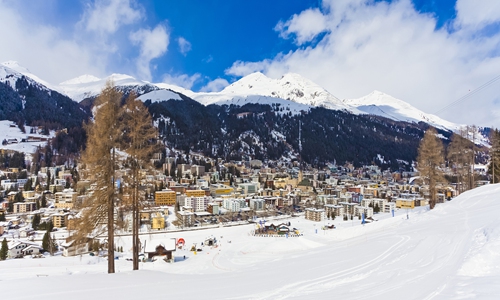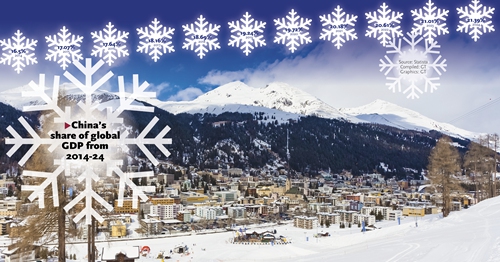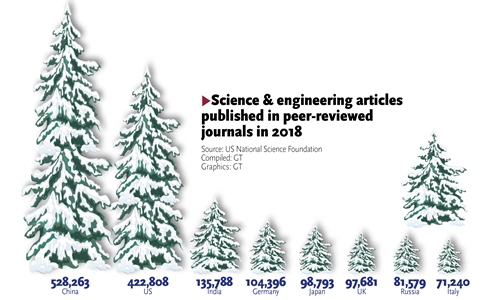
View of Davos. (Photo: VCG)

(Graphics: GT)

(Graphics: GT)
As nearly 3,000 political leaders, business executives, scholars and celebrities gather at the Swiss winter resort town of Davos to kick off the World Economic Forum's annual meeting on Tuesday, a litany of pressing issues wait to be discussed - from a fragile global economy to geopolitical and trade tensions to climate change.
Among the most popular topics at the meeting, also known as the Davos Forum, is the phase one trade agreement reached by China and the US last week, as well as any sign of further negotiations between the world's two biggest economies to address remaining issues in the trade tussle that continues to darken the global economic outlook, attendees and analysts said on Monday.
"The overall vibe of the meeting will be better given the phase one agreement, but questions remain over details of implementation," Lin Boqiang, director of the China Center for Energy Economics Research at Xiamen University, who is attending the forum for the 10th time, told the Global Times on Monday. "I feel there is more anxiety each year."
While the phase one deal between Beijing and Washington marked an official pause in the bruising trade war and offered some certainty, the interim agreement itself won't dispel rising concerns of the global community, which is also grappling with a host of other issues, including tensions in the Middle East.
Warning that the phase one agreement will not be able to deliver rapid improvement for the global economy, the World Bank downgraded its global growth forecast for 2020 by 0.2 percentage points to 2.5 percent. The IMF, which cut its forecast last year, is expected to further lower its outlook for global growth in a report expected to be released on Monday night.
"I think most people will be interested in when China and the US will start talks for a second phase agreement," Bai Ming, deputy director of the Ministry of Commerce's International Market Research Institute, told the Global Times on Monday, noting that there could be some signs from Chinese and US officials attending the forum.
US President Donald Trump is set to address the event on Tuesday morning. On the Chinese side, Vice Premier Han Zheng is scheduled to deliver remarks on Tuesday afternoon. It was unclear whether the two sides will hold meetings on the sidelines.
Trump is likely to focus mostly on his "America First" agenda and the strength of the US economy, while Han is expected to reiterate China's long-standing support for preserving multilateralism and free trade, Chinese analysts said.
"Both sides will likely mention the phase one agreement and their intention to continue talks to resolve their lingering trade tensions," Bai said. However, he said, many world leaders, particularly from the EU, will discuss how the bilateral deal between China and the US will affect their economies.
After the phase one deal was signed on Wednesday, the EU criticized it and even suggested that it may breach WTO rules. Chinese officials have stressed that the deal was in line with WTO rules and will not affect China's trading partners, arguing the vast Chinese market is big enough to do business with everyone.
An opening China
At the Davos forum, which Chinese officials have used in other years to highlight major reform and market opening measures at home, Han and other Chinese officials will likely stress China's continued efforts to open up the vast Chinese market to global investors, said Dong Dengxin, director of the Finance and Securities Institute at Wuhan University of Science and Technology.
"China's opening-up measures, particularly in the financial sector, have been very robust and effective," Dong told the Global Times on Monday. "Many foreign financial institutions are flocking to the Chinese market and more could follow as markets around the world are facing tremendous risks and uncertainty."
At the Davos Forum in 2017, when the world was grappling with a fresh tide of anti-globalization and trade protectionism, Chinese President Xi Jinping delivered a speech in firm support of the global free trade mechanism and vowed that "China will keep its door wide open and not close it."
Since then China has undergone deep reforms that have significantly opened up more sectors to foreign participation and increased imports of foreign products, analysts noted. Specifically, the country has repeatedly cut the list of sectors off-limit to foreign investors, passed a new Foreign Investment Law, and lifted ownership restrictions for foreign financial companies.
Even when it's battling downward pressure, the Chinese economy continues to be a bright spot for the global economy. In 2019, the world's second-largest economy grew by 6.1 percent year-on-year, and it is estimated to have contributed around 39 percent of global growth.
However, just as the anxiety among attendees of the Davos Forum will persist, the global economy will continue to face rising challenges, including protectionism and technology rivalry that has undermined global cooperation and innovation.
The meeting will also offer an opportunity for Chinese telecom company Huawei to ease concerns among regulators in Europe and beyond, as many are still deciding whether or not to heed a US call to shun the company from their 5G deployments. The outspoken Huawei founder Ren Zhengfei will participate in panel discussions.
Also likely to attract attention is the appearance of Carrie Lam Cheng Yuet-ngor, chief executive of the Hong Kong Special Administrative Region, which is grappling with the impact on the global financial hub from months of political unrest last year.


